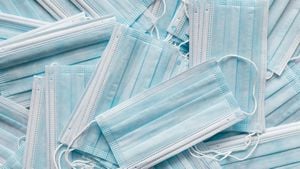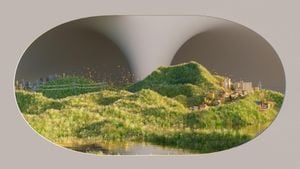Innovations and sustainable practices are reshaping the aquaculture industry, moving us closer to solutions for environmental challenges and food security. Recent developments include government initiatives, technological advancements, and collaboration among various stakeholders.
The Indian government's recent push for seaweed cultivation exemplifies how sustainability can be integrated with economic development. Under the Pradhan Mantri Matsya Sampada Yojana (PMMSY), the Ministry of Fisheries is implementing guidelines to boost seaweed production aimed at reaching over 1.12 million tonnes by 2025. This initiative is not just about numbers; it aims to improve the livelihoods of coastal communities by providing them with sustainable sources of income. The new regulations prioritize environmental safety and aim to streamline the seed importation process, which has long been seen as a bottleneck for growers. The import of quality seaweed seeds will help local farmers cultivate valuable species like Kappaphycus, which is widely used across various industries, including food and cosmetics.
On the technological front, the ICAR-Central Marine Fisheries Research Institute (CMFRI) has made strides by developing aquafeeds enhanced with black soldier fly larvae (BSF). This innovative approach aims to provide fish farmers with more sustainable and cost-effective feeding solutions, reducing reliance on traditional fishmeal and soy products. The collaboration between CMFRI and Amala Eco Clean reflects the growing trend of integrating sustainable practices with aquaculture. Such use of BSF, which thrives on organic waste, offers both ecological benefits and significant savings for fish farmers by improving feed conversion rates. These measures are indicative of the broader commitment to reducing environmental impacts and enhancing productivity across the aquaculture sector.
Similarly, global players like Mitsubishi have joined the sustainable aquaculture movement by backing Finnforel, a Finnish company innovatively focused on trout farming through its "Gigafactory" concept. This facility is envisioned to deliver environmentally friendly fish farming and processing under one roof, utilizing recirculatory aquaculture systems (RAS) to conserve water and reduce waste. The promise of year-round fish production, independent of weather conditions, marks significant progress. With Mitsubishi's resources and distribution channels, Finnforel aims to revolutionize local fish production and support food security efforts worldwide.
These innovations are part of a larger trend across the industry where companies are increasingly turning to novel feed ingredients to meet sustainable production goals. BioMar, for example, has integrated algal oil—a rich source of important Omega-3 fatty acids—into their feeds, thereby addressing the declining levels of these nutrients traditionally derived from marine sources. The flexibility offered by single-cell proteins and insect meals is also beginning to reshape feed formulations, enhancing both food quality and environmental responsibility.
At the recent Global Seafood Alliance’s Responsible Seafood Summit, industry leaders discussed the integration of alternative protein sources such as insect meals, which not only support fish growth but also bolster animal health through improved immune responses. The growing acceptance of these innovative feed solutions could significantly alter aquaculture practices, leading to more resilient, environmentally friendly systems.
Operating principles like zero waste and minimal water usage are gaining traction within the industry. The increase of investments aimed at scaling and developing these sustainable practices will be pivotal as the sector faces growing scrutiny over its environmental footprint. For investors like the Blue Revolution Fund, which recently raised €93 million for aquaculture investment, the focus on sustainability is not merely ethical—it's also seen as profitable.
Looking at the market dynamics, sustainable seafood practices are becoming pivotal as consumer awareness about food sourcing grows. Brands like Fish Said Fred and Sainsbury’s are receiving recognition for their commitment to responsible seafood sourcing, which is becoming increasingly important to consumers concerned about sustainability. The Aquaculture Stewardship Council (ASC) recently awarded these companies prizes for their adherence to ethical practices, reflecting both changing consumer preferences and the industry’s response to demand for transparency and sustainability.
Meanwhile, regulatory frameworks are also shifting. California's recent ban on octopus farming, for example, highlights the increasing attention on animal welfare and ecological sustainability within aquaculture policies. This legislative move not only protects ocean ecosystems but also aligns with heightened consumer awareness and advocacy for animal rights around seafood products.
Future prospects for aquaculture look promising, thanks to the combined efforts of industry leaders, governments, and consumers advocating for responsible practices. From advancements on the farm to innovations in feed and processing, the industry is actively striving to maintain high standards of sustainability.
With challenges such as climate change and overfishing looming large, continued investment and innovation are urgently needed to secure the future of aquaculture. Companies, researchers, and policymakers must continue to collaborate to create scalable, ecologically sound solutions. The steps taken today will play a pivotal role in shaping the sustainability of aquaculture for generations to come. This synergy could not only ease the tension between food production and environmental preservation but also lead to increased security for fish supply chains globally, crafting a resilient aquaculture framework responding effectively to both social and ecological demands.



